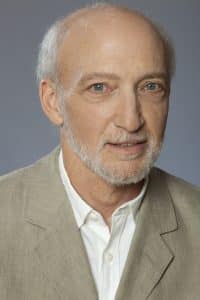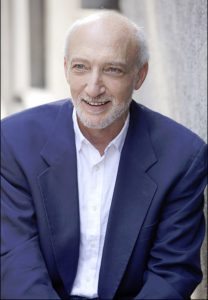Programme
Steven R. Gerber Music in Dark Times
Artists
English Symphony OrchestraAvailable to view for free from 14th-18th October, thereafter to ESO Digital supporters only.
Trailer
About this Concert
 The English Symphony Orchestra continue their innovative series of online concerts with a new webstream on the 7th of October, 2022 which features the broadcast premiere of Steven R. Gerber’s suite Music in Dark Times, written in 2005 for Vladimir Ashkenazy and the San Francisco Symphony, who gave the first performances in March 2009.
The English Symphony Orchestra continue their innovative series of online concerts with a new webstream on the 7th of October, 2022 which features the broadcast premiere of Steven R. Gerber’s suite Music in Dark Times, written in 2005 for Vladimir Ashkenazy and the San Francisco Symphony, who gave the first performances in March 2009.
Gerber’s 20-minute suite begins with a new orchestration of his “Fanfare for the Voice of America” which was commissioned by the USA’s international broadcaster, Voice of America, following the events of 9/11 in 2001. Gerber said of the Fanfare: “The title comes from the opening phrase in the trumpet, which spells out A-M-E-R-I-C-A… and the middle section is the first few notes of Yankee Doodle, which has been VOA’s theme song for most of its existence.” Other movements include a Pavane, inspired by a comment by Ashkenazy about the Fauré Pavane, a death dance in the form of a tarantella and a funeral march (Gerber called this movement “Dead March”). The work ends with an “Elegy for Strings” and a second, darker Fanfare, creating an arch-like form across the whole work.
“This is a compact, powerful work that really hits home,” say Kenneth Woods. “And it sadly seems more apropos than ever at the moment.”
In 2021, Kenneth Woods and the ESO released their first recording of Gerber’s music, including two Sinfonias for Strings and two Sinfoniettas for Orchestra. Fanfare Magazine called the recording “the perfect starting point for an appreciation of Steven R. Gerber’s gifts as a composer…Conductor Kenneth Woods leads the English String Orchestra and English Symphony Orchestra in propulsive, colorful, and nuanced accounts of the various works. The ensembles play with admirable precision and tonal richness.
Prior to his death in 2015, Gerber established the Steven R. Gerber Trust. The Trust have generously supported the ESO’s work on behalf of other contemporary composer, most particularly the work of Adrian Williams, whose First Symphony sees its release on CD and streaming on the 7th of October as well.
Discover More
About the Composer - Steven R. Gerber
 Steven R. Gerber was born in 1948 in Washington, D.C. and now lives in New York City. He received degrees from Haverford College and from Princeton University, where he received a 4-year fellowship. His composition teachers included Robert Parris, J. K. Randall, Earl Kim, and Milton Babbitt.
Steven R. Gerber was born in 1948 in Washington, D.C. and now lives in New York City. He received degrees from Haverford College and from Princeton University, where he received a 4-year fellowship. His composition teachers included Robert Parris, J. K. Randall, Earl Kim, and Milton Babbitt.
Two CDs of Gerber’s orchestral works were released on major labels in 2000. Chandos issued his Symphony No. 1, Dirge and Awakening, Viola Concerto, and Triple Overture, played by the Russian Philharmonic Orchestra under Thomas Sanderling, with Lars Anders Tomter, viola, and the Bekova Sisters Trio. KOCH International Classics, under a grant from the Aaron Copland Fund for Music, released his Violin Concerto, Cello Concerto, and Serenade for String Orchestra, played by the National Chamber Orchestra under Piotr Gajewski, with soloists Kurt Nikkanen and Carter Brey. After the American premiere of his Violin Concerto at the Concert Hall of the John F. Kennedy Center for the Performing Arts in 1995 by Nikkanen and the National Chamber Orchestra under Gajewski, the Washington Post called it “a major addition to the contemporary violin repertoire: lyrical, passionate, beautifully tailored to the instrument’s character and capabilities…Gerber has revived the spirit of romanticism in this work, with a strong sense of tonal melody and of the dramatic effects and surprises still possible in traditional forms…one of the year’s most memorable events.” And when Carter Brey premiered his Cello Concerto with the same orchestra and conductor in 1996, the Washington Post said, “Gerber’s concerto seems to have what it takes to establish a foothold…. The music is composed with a fine sense of instrumental color…. Gerber has given his soloist some fine, expressive melodies.”
Recent works of Gerber’s include a Viola Concerto written for Yuri Bashmet and premiered by Bashmet at his summer festival in Tours, France; String Quartets No. 4 and 5, written respectively for the Fine Arts and Amernet String Quartets; “Spirituals” for clarinet and string quartet, commissioned by Concertante Chamber Players for performances in 2000 at the Library of Congress and Merkin Hall (NYC) and in Harrisburg; a Clarinet Concerto for Jon Manasse, premiered by him with the National Philharmonic Orchestra under Maestro Piotr Gajewski, and “Fanfare for the Voice of A-M-E-R-I-C-A,” commissioned to celebrate VOA’s 60th anniversary, and premiered at the VOA auditorium on a 9/11 memorial concert in 2003. The Fanfare has since then been performed by the Wheeling Symphony, the Omaha Symphony, the University of Tennessee (Knoxville) Orchestra, and by the National Philharmonic Orchestra at the new Music Center at Strathmore as part of the 2005 ASOL convention.
Gerber’s music is well-known also in Russia and Ukraine, where he has had numerous tours with literally dozens of performances of his orchestral works as well as many concerts of his solo and chamber works. Several of his major works were given their world premieres there, including “Dirge and Awakening” by the Russian National Orchestra under Mikhail Pletnev at the Great Hall of the Moscow Conservatory, Violin Concerto by the Novosibirsk Philharmonic under Arnold Katz, with soloist Kurt Nikkanen, and Serenade Concertante by Chamber Orchestra Kremlin under Misha Rachlevsky at the Small Hall of the Moscow Conservatory. Gerber has written several works for famed Russian violinist Tatyana Grindenko.
In 2007 Arabesque released a CD of three of Gerber’s orchestral works, Spirituals for string orchestra, Clarinet Concerto, and Serenade Concertante, featuring the St. Petersburg State Academic Symphony, conducted by Vladimir Lande, and clarinetist Jon Manasse. In 2009 Naxos will release on its American Masters series a CD of nine solo and chamber works of Gerber, all featuring violinist Kurt Nikkanen, and including violinists Cho-Liang Lin and Cyrus Beroukhim, cellist Brinton Smith, and pianist Sara Davis Buechner.
Gerber recently completed a new orchestral work, “Music in Dark Times,” commissioned by Vladimir Ashkenazy. The four world premiere performances took place in March, 2009, with Maestro Ashkenazy conducting the San Francisco Symphony.
Find out more at www.stevengerber.com
CRITICAL PRAISE FOR THE MUSIC OF STEVEN R. GERBER
Chandos CD (Catalogue No. 9831)
Every once in a while, something comes along that is so striking that the usual list of influences, metaphors, and descriptors becomes superfluous. Such is the case with Steven Gerber’s First Symphony (1988-89). The three-movement work held me mesmerized and fascinated for its entire 25-minute length. (American Record Guide)
Each work is an important addition to music in the late 20th century, its sense of evolution from previous generations welcome at a time when change seems to have become a virtue in itself. (Fanfare)
Steven R. Gerber has one of the most direct and readily accessible voices in contemporary American music. The works on this disc…have distinctive and powerful melodic contouring. Gerber’s urgent, highly charged language arouses graphic emotions, even at first hearing. (Rough Guides/online)
Gerber has a strong melodic gift…he’s a composer with a strong and communicative voice of his own. (International Record Guide)
This is music of our time that I most strongly urge you to hear. (The Strad)
KOCH Orchestral CD (Catalogue No. KIC-CD-7501)
Steven Gerber is another outstanding composer of the new American school…The beautiful Violin Concerto is a superb example. In the first movement he uses hauntingly memorable material from his college years and writes unashamedly tonally and in sonata form…The Cello Concerto opens equally atmospherically and the soloist ruminates evocatively. The scoring is economical and very telling….These are splendid works and both soloists are fully worthy of them, and completely inside this consistently memorable music. The String Serenade…is hardly less memorable and individual… (The Penguin Guide to Compact Discs – 2002 Edition)
Violin Concerto
Steven R. Gerber’s Violin Concerto, which had its American premiere last night in the Kennedy Center Concert Hall, is a major addition to the contemporary violin repertoire: lyrical, passionate, dramatic, beautifully tailored to the instrument’s character and capabilities. It was the highlight of a program that was always fascinating and often exhilarating: the 10th anniversary celebration of the National Chamber Orchestra…Amid so many competing attractions, the Gerber Violin Concerto still stood out as few contemporary works do in programs shared with older music. Gerber… has revived the spirit of romanticism in this work, with a strong sense of tonal melody and of the dramatic effects and surprises still possible in traditional forms…one of the year’s most memorable events. (Washington Post)
Clarinet Concerto
The world premiere of Steven Gerber’s new Clarinet Concerto… [was] an important musical event. Written for Jon Manasse, …the evening’s soloist, the concerto is the work of a composer whose idiom is a coherent and logical amalgam of centuries of musical thought. Its opening thematic material, angular but immediately memorable, serves as a structural element when it reappears in each of the two movements. The character of the solo line and its textural orchestral support evolve easily from sharply defined and disconnected points of sound to passages of easy lyricism, and all of this develops naturally and without any sense of gimmick or premeditation. Most compelling, however, is Gerber’s orchestration. Within the context of a spare pizzicato texture, he has the harp, in its lowest and most sonorous range, functioning as almost a second solo instrument… the development of the second movement’s fugue theme in the low woodwinds is delightful. (Washington Post)
String Quartet No. 4
Gerber used lyrical, tonal writing as comfortably as unabated dissonance in creating stirring music with this quartet. Constructed of four short, highly inventive movements, the piece was well-received by the near-capacity crowd at the University of WisconsinMilwaukee Fine Arts Recital Hall. The quartet opens with a ‘Moderato’ movement of diatonic melodies that washes by on a wave of unabated tension. The second movement, marked ‘Lento,’ creates a gnawing dissonance through shifting chromatics at close intervals. The dramatic center of the piece is found in the third movement, marked ‘Maestoso, con moto.’ A single theme is repeated continually throughout the movement in bold gestures that make it impossible to turn away. The finale movement takes ideas from the earlier movements and weaves them into a satisfying coda. (Milwaukee Journal Sentinel)
Cello Concerto
It is risky to predict the future of any new piece of music at a time when the audience is believed to be shrinking even for established classics. But Gerber’s concerto seems to have what it takes to establish a foothold…. The music is composed with a fine sense of instrumental color, not only in the solo cello but also in the orchestration, which is vivid without losing the transparency essential in music for a chamber orchestra…. Gerber has given his soloist some fine, expressive melodies…the audience applauded him warmly and at length. (Washington Post)
For additional reviews and other information please visit www.stevengerber.com
Production Information
Recorded at Wyastone Concert Hall, Monmouth, on 2nd December 2021
Producer: Phil Rowlands
Videographer: Tim Burton
Orchestra Manager: Simon Brittlebank / The Music Agency
Stage Manager: Rob Bull / The Music Agency
